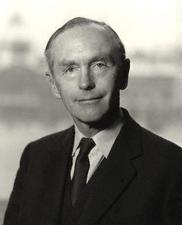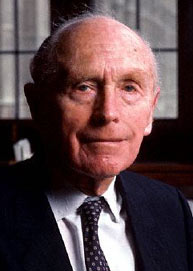Alec Douglas-Home
|
|
| Period in Office: | 19 October, 1963 - 16 October, 1964 |
| PM Predecessor: | Harold Macmillan |
| PM Successor: | Harold Wilson |
| Date of Birth: | July 2, 1903 |
| Place of Birth: | Mayfair, London |
| Political Party: | Conservative |
| Retirement honour: | Life Barony (Home of the Hirsel) |
Alexander Frederick Douglas-Home, Baron Home of the Hirsel KT1 (July 2, 1903 – October 9, 1995), known from 1951 to 1963 as the 14th Earl of Home, was a British politician, and served as Prime Minister of the United Kingdom for a year from October 1963 to October 1964. He became famous for a series of records. He was the last member of the House of Lords to be appointed Prime Minister, the only Prime Minister to resign from the Lords and contest a by-election to enter the House of Commons and to date the last Prime Minister to be actively chosen by a British monarch.
| Contents |
|
1 Titles from birth to death |
Early Life and Career
Douglas-Home was born in Mayfair, London, the eldest son of a Scottish earl. From 1918 he held the courtesy title Lord Dunglass. His brother was the dramatist, William Douglas-Home. After an education at Eton College and Christ Church, Oxford, he became Conservative MP for Lanark in 1931. His aristocratic roots gave him a head start in the party as it then was, and he was soon appointed Principal Private Secretary to Neville Chamberlain, witnessing at first hand the latter's attempts to stave off World War II through negotiation with Adolf Hitler. He lost his parliamentary seat in the 1945 general election, but regained it in 1950. However he was forced to resign it in 1951, when he inherited his father's seat in the House of Lords, becoming 14th Earl of Home. This did not blunt his political aspirations, though, as Lord Home, as he then was, served not only as Commonwealth Secretary from 1955 but, from 1957, also as Leader of the House of Lords and Lord President of the Council (the latter twice; briefly in 1957 and subsequently from 1959). Home traded all three for the Foreign Office in 1960. In 1962, he was created a knight of the Order of the Thistle — the highest honour outside the nobility available to a Scot — which entitled him to be styled "Sir" after renouncing his earldom.
Appointment as Prime Minister
In 1963 the Conservative prime minister, Harold Macmillan, suddenly resigned when diagnosed with prostate cancer from which he was (wrongly) not expected to recover. At the time, the rules of Conservative Party stated that a leader was not to be selected by a vote of party members, but rather by a decision of the party's elder statesmen. Though Rab Butler, nominally the "Deputy Prime Minister" (though officially no such constitutional office then existed, with the title on its rare usages being an honorific one) was the favourite among Conservative MPs the elder statesmen preferred Home, some of them indicating that they would refuse to serve in cabinet under Butler and the other potential candidate, Quintin Hogg, then known as Lord Hailsham. Outgoing Prime Minister Harold Macmillan advised Queen Elizabeth II of the opinion of the senior figures in the party. Though it was argued that he had no right to advise the Queen as to who to invite to Kiss Hands as Prime Minister, and the Queen was under no obligation to accept his advice, the Queen duly invited the Earl of Home to become Prime Minister and First Lord of the Treasury. Home, the first British prime minister born in the 20th century, believed it impractical to serve as Prime Minister from the Lords (it was widely believed that Lord Curzon had not been invited to become prime minister in the 1920s because of his position in the Lords). Using the Peerage Act 1963 passed earlier in the same year after the campaign of Tony Benn to renounce his peerage, Home disclaimed his Earldom and as Sir Alec Douglas-Home contested a by-election in the safe seat of Kinross & West Perthshire. Home duly won, entering the history books as the (probably) last peer to become Prime Minister and the only Prime Minister to resign the Lords to enter the Commons. In 1965, the rules of the Conservative Party were changed so that the party leader would henceforth be selected by the 1922 Committee consisting of parliamentary members of the Party.
Defeat and Opposition
The government had been too badly damaged to survive, however, and the October 1964 general election was won by the Labour Party under the new leadership of Harold Wilson, but by a much narrower margin than was expected. It was in this campaign that Home made his most famous remark. Wilson kept gibing that Home was not a man of a people as he was the 14th Earl of Home. Home's response: "As far as the 14th Earl is concerned I suppose that Mr. Wilson, when you come to think of it, is the 14th Mr. Wilson".
Home remained leader of the party until his resignation in July of the following year. In the interim he created an electoral mechanism for choosing Conservative Party leaders, a vote by MPs. The resulting leadership election was won by Edward Heath who defeated Reginald Maudling and Enoch Powell. Over the course of the following six years Home was notably loyal to Heath, comparing those who questioned his position with impatient gardeners who would keep digging up a tree to gauge its progress by examining its roots. When, in 1970, Heath became prime minister, Home returned to the post of Foreign Secretary which was deemed to suit him so well.
In 1973 Home intimated his intention to retire from Parliament and government at the next general election, but was overtaken by the calling of a snap general election in February 1974. Following the defeat of the Heath government by that of Harold Wilson in 1974, Home retired from front-line politics, standing down from the Commons at the October 1974 election. He was then restored to the House of Lords when he accepted a life peerage, becoming known as Baron Home of the Hirsel (The Hirsel being his family seat in Berwickshire). but continued to make interventions in the House of Lords into his nineties. Home was the third-longest lived British Prime Minister behind Harold Macmillan and James Callaghan. On his death, he was succeeded as Earl of Home by his son, David. Autobiography: The Way The Wind Blows (1976)
Titles from birth to death
Alec-Douglas-Home-arms.PNG
- Alexander Douglas-Home, Esq (1903-1918)
- Lord Dunglass (1918-1931)
- Lord Dunglass, MP (1931-1945)
- Lord Dunglass (1945-1950)
- Lord Dunglass, MP (1950-1951)
- The Right Honourable Lord Dunglass, MP (1951)
- The Right Honourable The Earl of Home, PC (1951-1962)
- The Right Honourable The Earl of Home, KT, PC (1962-1963)
- The Right Honourable Sir Alexander Douglas-Home, KT, PC (1963-1973)
- The Right Honourable The Lord Home of the Hirsel, KT, PC (1973-1995)
Sir Alec Douglas-Home's Government, October 1963 - October 1964
- Sir Alec Douglas-Home: Prime Minister
- Lord Dilhorne: Lord Chancellor
- Quintin McGarel Hogg: Lord President of the Council
- Selwyn Lloyd: Lord Privy Seal
- Reginald Maudling: Chancellor of the Exchequer
- Rab Butler: Secretary of State for Foreign Affairs
- Henry Brooke: Secretary of State for the Home Department
- Sir Keith Joseph: Minister of Housing and Local Government
- Peter Thorneycroft: Secretary of State for Defence
- Julian Amery: Minister of Civil Aviation
- Ernest Marples: Minister of Transport
- Frederick James Erroll: Minister of Power
- Edward Heath: Secretary of State for Industry, Trade, and Regional Development and President of the Board of Trade
- Duncan Edwin Sandys: Secretary of State for the Colonies and Secretary of State for Commonwealth Relations
- Sir Edward Boyle: Secretary of State for Education
- Anthony Barber: Secretary of State for Health
- John Boyd-Carpenter: Chief Secretary to the Treasury and Paymaster-General
- Joseph Bradshaw Godber: Minister of Labour and National Service
- Geoffrey Rippon: Minister of Public Works
- Christopher Soames: Minister of Agriculture
- Michael Noble: Secretary of State for Scotland
- Lord Blakenham: Chancellor of the Duchy of Lancaster
- William Francis Deedes: Minister without Portfolio
- Lord Carrington: Minister without Portfolio, Leader of the House of Lords
Changes
- April 1964 - Quintin McGarel Hogg becomes Secretary of State for Education and Science. Sir Edward Boyle leaves the Cabinet.
| Preceded by: The Viscount Swinton | Secretary of State for Commonwealth Relations 1955–1960 | Succeeded by: Duncan Sandys | |||
| Preceded by: The Marquess of Salisbury | Leader of the House of Lords 1957–1960 | Succeeded by: The Viscount Hailsham | |||
| Preceded by: The Marquess of Salisbury | Lord President of the Council 1957 | Succeeded by: The Viscount Hailsham | |||
| Preceded by: The Viscount Hailsham | Lord President of the Council 1959–1960 | Succeeded by: The Viscount Hailsham | |||
| Preceded by: Selwyn Lloyd | Foreign Secretary 1960–1963 | Succeeded by: Rab Butler | |||
| Preceded by: Michael Stewart | Foreign Secretary 1970–1974 | Succeeded by: James Callaghan
|


